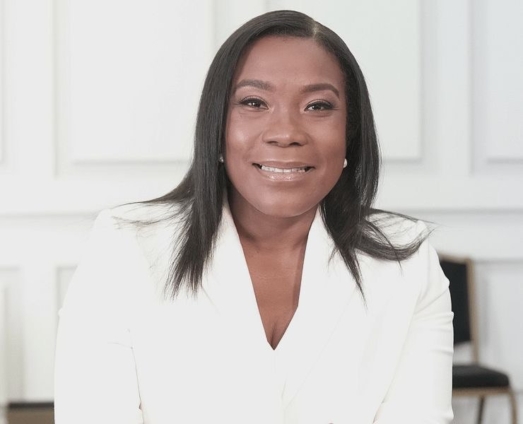Her Excellency Edite Ten Jua, a former Minister of Justice and Foreign Affairs and a former member of the Constitutional Court of São Tomé and Príncipe, has praised Ghanaians for the country’s pivotal role in advancing peaceful democratic transitions.
She highlighted Ghana as a beacon of inspiration for many nations due to its unwavering commitment to constitutional democracy and its active role in promoting political stability within the West African sub-region.
Her Excellency Ten Jua made these remarks during a Ghana Elections Roundtable organised by the Africa Governance Centre on Friday, 29th November 2024.

Under the theme, “The Judiciary and Ghana’s Electoral Democracy”, the event brought together experts and stakeholders from across the region to share experiences and reflect on strategies for free, fair, and transparent elections in Ghana.
In her address, she emphasised that Ghana’s democracy must withstand the test of time, particularly in light of recent challenges in the sub-region, including calls for electoral reforms, political instability, and domestic economic difficulties.
“The 7th December election will not only determine Ghana’s president or parliamentarians but will also serve as a critical affirmation of Ghana’s credentials as one of Sub-Saharan Africa’s most resilient and respected democracies,” she stated.
The Roundtable also featured Justice William Atuguba, a former Justice of the Supreme Court of Ghana, who presided over the 2012 presidential election petition.
Justice Atuguba vehemently refuted claims that election petitions disproportionately favour incumbents, citing the 5-4 split decision during the historic 2012 Election Petition.
He underscored the necessity of judicial independence, noting that the protections under the 1992 elections framework are insufficient, and called for a review of the judiciary’s appointment process to reduce the executive branch's overwhelming influence.
Other high-profile speakers included Justice Dennis Dominic Adjei of the Court of Appeal and the African Court on Human and Peoples’ Rights; Professor Ernest Kofi Abotsi, Dean of the UPSA Law School; and Mr Doug Coltart, a lawyer and human rights advocate from Zimbabwe.
Justice Adjei, reflecting on the evidential requirements in court during election petitions, criticised the precedent set by the apex court in the 2020 Election Petition.
He argued: “One cannot tell a party they will not be allowed to call a witness, especially when it is their right to do so. The fundamental principle is that a party has the right to call witnesses, and if they are unwilling to appear, the coercive powers of the court should compel their attendance. If they fail to comply, they can be held in contempt. Denying a party the ability to call a witness is a significant disservice.”
Professor Abotsi stressed that the courts should prioritise substantive matters over procedural technicalities in election petitions.
He argued that the courts should not concern themselves with who wins or loses but instead focus on uncovering the truth, as the ultimate objective is justice. “The courts must take an interest in vindicating the individual who has genuinely been elected,” he added.
Doug Coltart, addressing fairness in the courts, observed that electoral litigation is inherently political, placing the judiciary in the challenging position of making decisions with political ramifications.
To ensure transparency, he suggested: “The courts must do everything within their power, within the framework of the rules as currently framed, to provide parties and citizens access to evidence crucial for election petitions.”
The Africa Governance Centre, which organised the event, is a think tank dedicated to promoting good governance, democracy, and economic transformation across the African continent.
Its mission is to work with governments, civil society organisations, democratic institutions, and international partners to strengthen institutions and foster transparent, inclusive governance processes.
Latest Stories
-
Constitution’s impeachment provisions for Chief Justice are ‘inadequate’, says Sophia Akuffo
5 minutes -
We won’t be a disruptive Minority but will serve the interest of Ghanaians – Gideon Boako
21 minutes -
‘Merit over patronage’ – Sophia Akuffo calls for overhaul of Chief Justice selection process
27 minutes -
GPL: You have benefited from refereeing decisions – Dreams FC slams Accra Lions for calling for reforms
41 minutes -
Deschamps to leave France job after 2026 World Cup
1 hour -
NCCE congratulates Mahama, calls for unity and post-election collaboration
3 hours -
‘Democracy must work for the people’ – Mahama promises tangible change as he resets Ghana
3 hours -
Why Akufo-Addo calls me Johnny – Mahama reflects on rivalry, respect, and history
3 hours -
‘A beacon of hope’ – Prof. Opoku-Agyemang’s rise lauded by NDC Professionals Women
4 hours -
Ghana’s leadership a beacon of hope for Africa – Tinubu
4 hours -
Explosive fertiliser in Ivory Coast harbour nothing to fear, officials say
4 hours -
Nigerian atheist freed from prison but fears for his life
5 hours -
Djokovic still has ‘trauma’ over Covid deportation
5 hours -
Constitution isn’t broken, but it needs a service – Former Chief Justice Sophia Akuffo
5 hours -
Macron accused of ‘contempt’ over Africa remarks
6 hours

